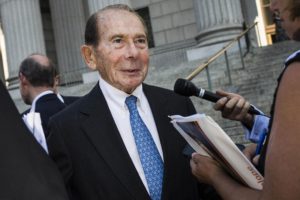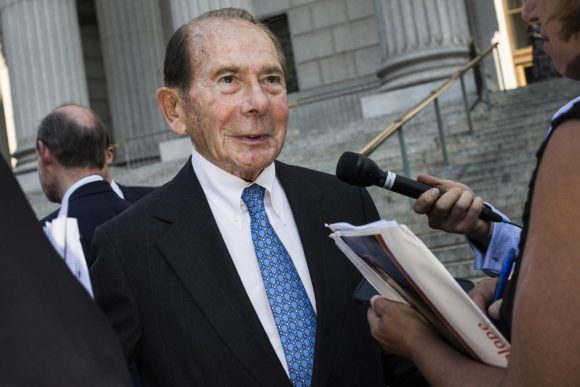Maurice “Hank” Greenberg told a judge that he was just too busy to commit fraud.
After 4 1/2 days of intense questioning by a government lawyer, Greenberg finally got to elaborate on his defense to civil fraud allegations through friendly questioning by his own attorney, David Boies.
The former American International Group Inc. chairman told a judge that he relied on underlings to handle the details of individual deals. He said he was busy elsewhere, visiting as many as 30 countries in a typical year and spending each day reviewing hundreds of pages of documents, participating in as many as 70 telephone calls and attending numerous meetings.
“It was such a big company,” Greenberg said. “It was hard for me to cover all the bases.”
“Did you have confidence in the AIG people on whom you were relying on for the two transactions at issue?” Boies asked.
“Absolutely,” Greenberg replied.
The 91-year-old spent has spent much of his time on the witness stand in often-testy exchanges while defending his decision to enter into two transactions in 2000 that New York Attorney General Eric Schneiderman alleges were orchestrated to hide AIG’s true financial condition from shareholders.
Greenberg said he trusted his underlings to structure the transactions and relied on the company’s lawyers and accountants to make sure they conformed with regulations.
Two Deals
The lawsuit, originally filed by then-Attorney General Eliot Spitzer in 2005, accuses Greenberg and former AIG Chief Financial Officer Howard Smith of arranging two transactions in 2000 to conceal the insurer’s real fiscal health. One was a $500 million deal with Berkshire Hathaway Inc.’s General Reinsurance Corp. allegedly used to offset a decline in loss reserves. The second was an agreement with a Barbados-based re-insurer, CAPCO Reinsurance Co., allegedly used to offload underwriting losses from a failed auto-warranty program.

Greenberg and Smith resigned earlier that year amid an accounting scandal, and New York-based AIG then restated its earnings, lowering them by $3.4 billion and agreeing to pay $1.64 billion to settle the claims without admitting or denying wrongdoing. Greenberg and Smith have said both transactions were properly accounted for and reported on financial statements.
During the end of Assistant Attorney General David Nachman’s questioning Wednesday, Greenberg denied that the motivation behind the Gen Re deal was to remove $100 million in loss exposure from AIG’s books.
The lawsuit alleges that Greenberg was so upset with a drop in AIG’s share price due to a decrease in loss reserves, a key measure of an insurer’s fiscal health, that he called Ronald Ferguson, Gen Re’s CEO at the time, to set up a deal that would boost the reserves in exchange for a $5 million payment, according to the lawsuit. The shares declined after AIG reported in October 2000 that third-quarter premiums increased as loss reserves fell.
Gen Re Deal
Nachman grilled Greenberg on why he didn’t press AIG’s former head of reinsurance, Christian Milton, for answers when Milton told him in 2002 that Gen Re had concerns about the deal and wanted to end it. Greenberg said he didn’t dictate the terms of the agreement and emphasized that he wasn’t responsible for working out its details.
Four former Gen Re executives, including Ferguson, and AIG’s Milton were convicted of accounting fraud in 2008 in connection with the transaction but won reversals in 2011. Federal prosecutors agreed to drop the charges in 2012 under deferred-prosecution agreements after the former executives admitted “aspects” of the Gen Re deal were fraudulent.
Greenberg spent much of last week answering Nachman’s questions about the CAPCO transaction, maintaining that the deal was insignificant and that he only got personally involved in order to teach some managers a lesson and allow others to avoid being blamed for the failed auto-warranty program.
On Wednesday, Boies asked Greenberg why he needed to teach them a lesson and whether he ever discussed whether it might affect how investors and analysts viewed the company.
“No,” Greenberg said. “It was so tiny in relationship to AIG that it wouldn’t have made a difference.”
The case is State of New York v. Greenberg, 401720-2005, New York state Supreme Court (Manhattan).
Topics Fraud New York Reinsurance AIG
Was this article valuable?
Here are more articles you may enjoy.



 World’s Growing Civil Unrest Has an Insurance Sting
World’s Growing Civil Unrest Has an Insurance Sting  Insurance Broker Stocks Sink as AI App Sparks Disruption Fears
Insurance Broker Stocks Sink as AI App Sparks Disruption Fears  The $10 Trillion Fight: Modeling a US-China War Over Taiwan
The $10 Trillion Fight: Modeling a US-China War Over Taiwan  State Farm Adjuster’s Opinion Does Not Override Policy Exclusion in MS Sewage Backup
State Farm Adjuster’s Opinion Does Not Override Policy Exclusion in MS Sewage Backup 

